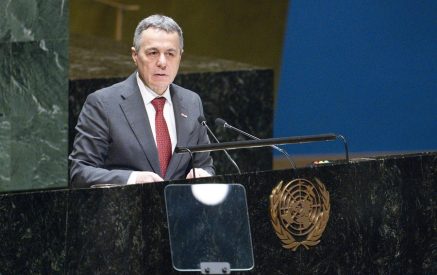The evolving nature of the threat posed by terrorists and violent extremists requires enhancing co-operation at all levels, including between parliamentarians, said Chair of the OSCE PA’s Ad Hoc Committee on Countering Terrorism (CCT) Makis Voridis (Greece) at today’s opening plenary session of the International Conference on Counter-Terrorism in St. Petersburg.
“The overall number of terrorist acts has increased worldwide, and the drivers of terrorism are also changing, with factors related to political extremism and disenfranchisement becoming more prominent,” Voridis said. “To ensure an effective approach to the international fight against terrorism and violent extremism, greater involvement of parliamentarians and leveraging their comparative advantages of policy-making and oversight is indispensable.”
The conference, organized by the Interparliamentary Assembly of the Commonwealth of Independent States with the support of the OSCE PA and of several other parliamentary assemblies and UN agencies, included the participation of some 15 parliamentarians from the OSCE PA. In addition to CCT members Voridis and Lisa Chambers (Ireland), the OSCE PA delegation included human rights committee Chair Margareta Kiener Nellen (Switzerland) and economic and environmental committee Rapporteur Elona Gjebrea Hoxha (Albania).
The conference explored issues such as challenges associated with prosecution, rehabilitation and reintegration of foreign terrorist fighters, the role of international institutions in building a common strategy to counter terrorism and the need to better address terrorism financing. Voridis chaired Session Three on “Preventing Illegal Use of Network Technologies, Mass Media and Social Networks to Spread Extremist Ideas,” which also featured Chambers as a keynote speaker.
Read also
“When seeking to prevent radicalization and illegal use of social media and social networks, individual countries cannot work in isolation – we must act as a global community to tackle this universal problem,” Chambers said. “Online platforms do not recognize land borders and so if we want to get ahead, we must come together. We can do this by talking, sharing information and developing international best practice, this is precisely why the CCT was established and why our work has been so effective. We are learning from each other and working together as parliamentarians, using the avenues open to us to direct policy and enact legislation in our own countries.”
Intervening in the session on “Stepping Up Efforts Against the Financing of Terrorism and Extremism,” Kiener Nellen said: “To prevent terrorists from benefiting from transnational organized crime as a source of financing or logistical support, the international community needs to urgently co-ordinate its efforts at the local, national, regional, and international levels.”
Conference participants concurred that countering terrorism and violent extremism is a common goal and priority for the international community, including for parliamentary institutions. They also confirmed the relevance of the provisions of the United Nations Global Counter-Terrorism Strategy adopted by the UN General Assembly in 2006, noting that parliamentarians play a key role by adopting relevant legislation, allocation of budget funds and performing oversight to ensure protection from terrorist violence in line with human rights obligations.
Voridis held bilateral talks on the margins of the conference with Yuri Fedotov of the UN Office on Drugs and Crime, Sergei Lebedev of the Commonwealth of Independent States, and Liliane Maury Pasquier of the Parliamentary Assembly of the Council of Europe, to better co-ordinate efforts in the fight against terrorism, violent extremism and radicalization leading to terrorism.






















































